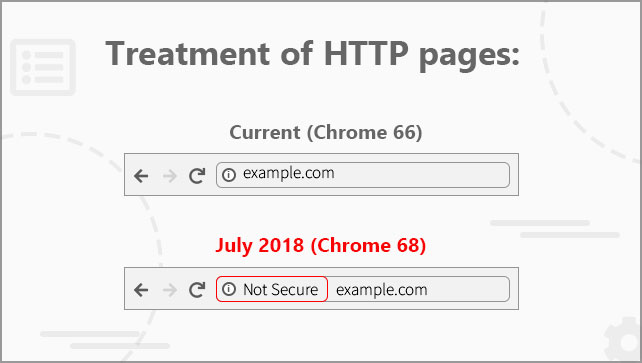60% of all website visits come from Google Chrome. Visitors to your websites are browsing a number of sites like social media, blogs, travel etc. They post a lot of personal and financial details. Google plans to ensure that none of this data is misused by requiring encryption of all data from browser to the server. Google is also trying to get other browsers to follow suit (although no official announcement has been made by other browsers).
What is an SSL Certificate?
It is the superhero that makes sure your web surfing experience is safe and no one gets hold of your data… “How does it do so?” you may ask. If the website that you are browsing has SSL Certificate, the URL will start with “HTTPS” contrary to “HTTP” which means the data is transferred in a secured manner. Before you ask “how does it send it in a secured manner?” let me answer by saying Encryption and Identification. These are the 2 Major functions of an SSL .
Encryption :
Here is where both your web browser and the server encrypts the data into gibberish to ensure if anyone gets hold of your data they won’t be able to get hold of your sensitive information.
Identification :
Only encrypting the data doesn’t cut the mustard. We have to make sure the data is going to the right party. So SSL talks to the server and understands if it is the right server by sending and receiving the SSL certificate which is provided to the web server by the Certificate Authorities.
The initiative began in 2016 where Google announced that from the starting of 2017 websites that don’t have SSL will be marked unsafe and with the release of Chrome v56. Hence HTTP Pages with sensitive information (password, banking details, etc) were marked as unsafe in the URL bar.
In Jan 2017 (Chrome v56) , Google started showing non-SSL login forms as Not Secure.

When the site is equipped with SSL certificate
In February 2018 Google announced that by July 2018 all website owners need to install SSL certificate on their websites. The websites that don’t have SSL Certificates installed will be flagged by Google Chrome and Google Search engine as “unsafe”. This will also affect the SEO of the website thus putting you at a disadvantage if you are a website owner. As 2/3rd of all websites do not use SSL certificates, you can gain a competitive SEO advantage by adding an SSL certificate to your website.
Leapswitch offers various types of affordable SSL certificates suited for your usage –
Personal blogs and websites – RapidSSL
Small and Medium Enterprises – GeoTrust QuickSSL Premium
Large corporations, e-commerce websites – GeoTrust True BusinessID
Finance industry, banks, large e-commerce portals – GeoTrust True Business ID with EV
Get in touch with our team and secure your website today! Call us on +91-9595-233-556 or send an email to sales@leapswitch.com

